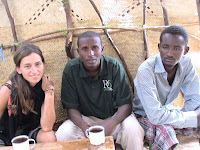 bars some four meters from the ground while the truck is being tossed and shaken on potholes and bumps for three hours) but offered a chance of delightful breeze and great views.
bars some four meters from the ground while the truck is being tossed and shaken on potholes and bumps for three hours) but offered a chance of delightful breeze and great views.My fellow passengers spoke little English but even so tried to point out interesting landscape features and animals to me. The road led through stunning, if inhospitable, terrain. After the initial desert flatland, the truck started climbing through grey dunes and stony hills, only to reach another flat plateau, this time covered in dry grasses and shrubs. There were mountains in the distance. As for animals, we did not see many, but there were camel and goat herds, ostriches, gazelles, hyenas and my favourite, tiny dikidiki antelopes, which always come in pairs and are reputed to be so attached to their life-long mate that if one of them dies the other withers away in the matter of days. Very romantic.
When it got dark, we fell silent and observed the many white hares (actually, I don’t think they were white at all but they looked white in our blinding long head-lights) which would spring out from the sides of the road and run madly alongside the truck for a while. The darkness was all-engulfing, save the triangle of light in front which, as we turned directions, would hit and bring out to view single trees and lone-standing rocks on our path – the effect was magical, as if these things were being instantly created out of the void. I was mesmerized and only after a while realised that the men around me all started chanting unisono; then one of the men would pick up the lead and melodically recite, what I now know was, the story of a Dassanech warrior’s life: the names of his camels, the women he loved, the enemies he vanquished and the wells he visited. His voice would rise above the others boisterously for a while but then fall again into the chorus and another man would pick up the song. It all felt unreal: the men chanted, the lorry rolled, the hares fled and I tried not let all this hypnotise me into life-threatening slumber. As I felt I cannot resist anymore, I climbed down onto the cosy maize sacks, made myself a lair in a nook, and let the song of the warriors lull me to sleep.
We arrived in Iloret well before sunrise. Abdrizak, who accompanied me on the lorry, arranged for us to stay in one of the bomas so that we could still get some sl
Soricho was very much like Horr in terms of architecture and topography. It was sprawled out north There were larger and smaller igloo-like huts, some of them behind kraals, others just scattered on the main tract that run through the village. There were a few mud houses, with either thatched or corrugated iron roofs as well as one stone structure that apparently used to be a church once upon a time. There was a shop and even a restaurant but you would never know them from other houses and it took me a while to discover their presence. The Dassanech people among whom I have found myself were mostly dressed traditionally, t
Unfortunately, it turned out that there was a boat going the very same day but it had already left. It would take to long to describe the whole process of securing the transport. It suffices to say I would have never done it without Abdrizak who, while infuriating me with his slowness and indecisiveness, managed in the end to find out if there is a boat going. He took time and would never give me answers I craved; but he understood the Dassanech much better and realised that what they said was rarely precise or very certain. So while I was jumping at every mention of boats and rushed to secure the passage with the individual that promised it, Abdrizak just cautioned me to wait patiently until one of the many boats that might be coming materialises.
As I might have mentioned waiting is not something I do very well. There were times during the two day wait that I was at my wits’ end. I could venture far out of the village because at any given time one of those phantom boats might have been coming. Besides, during the day it was just far too hot to even think of moving and when I tried to move about Abdrizak would nervously bid me not to wander aimlessly on account of the scorpions and snakes. So for most of the day I would just lie on the mattress that Mama Habiba thoughtfully put in one her mud-huts for me (I slept in my tent at night), try to read or write but end 
No comments:
Post a Comment